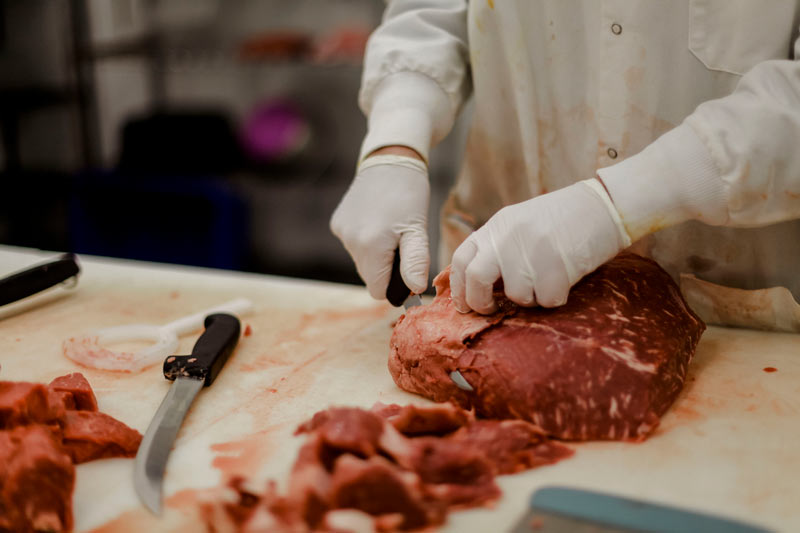Bagley Meat Market Edwardsville IL – Serving You with the Best Meats in Town
Bagley Meat Market Edwardsville IL – Serving You with the Best Meats in Town
Blog Article
Why Purchasing at a Regional Meat Market Guarantees Fresh, High-Quality Cuts
Buying at a neighborhood meat market uses unique benefits that commonly go undetected by consumers accustomed to larger retail chains. The implications of choosing local expand past instant benefits, motivating a more detailed assessment of what this option really implies for both consumers and the neighborhood economic situation.
Benefits of Local Sourcing
In the realm of food procurement, the benefits of local sourcing stand apart prominently. By acquiring meat from neighborhood markets, consumers gain direct accessibility to products that are frequently fresher and extra savory than those discovered in larger, business grocery stores. Neighborhood sourcing minimizes the time and range food travels from ranch to table, which not only improves preference yet likewise preserves dietary value.

In addition, local sourcing typically supplies openness concerning the beginnings of the meat. Customers can ask about the farming techniques made use of, pet welfare standards, and whether the meat is grass-fed or organic. This information encourages shoppers to make educated choices aligned with their values.
Quality Assurance Requirements
Neighborhood meat markets commonly abide by strenuous quality assurance requirements that guarantee the products supplied satisfy high safety and quality standards. These requirements generally encompass various stages of the meat manufacturing process, from sourcing to handling and storage space.
First, regional markets frequently develop rigid provider standards, making sure that only credible ranches and producers are used - bagley meat market edwardsville il. This decreases the chance of contamination and promotes greater animal well-being standards. In addition, numerous neighborhood meat markets apply routine inspections to validate that the meat is processed under hygienic conditions, additionally reducing wellness risks
Temperature level control is another important facet of quality guarantee. Local meat markets often monitor refrigeration systems to preserve optimum storage temperature levels, ensuring that meat stays fresh and secure for usage. Moreover, the application of traceability systems allows markets to track the origin of their items, providing transparency and liability.
Lastly, staff at regional meat markets are usually trained to acknowledge indicators of spoilage and understand appropriate handling strategies. This dedication to quality assurance not only raises the general criterion of the meat yet also fosters consumer depend on, making neighborhood meat markets a dependable source for premium cuts.
Sustaining Neighborhood Farmers
Sustaining local farmers is essential for fostering a sustainable food system and enhancing community durability. They directly add to the incomes of farmers in their region when customers pick to shop at regional meat markets. This not only sustains the regional economic climate however also strengthens the agricultural field, making certain that it continues to be sensible and lively.


Furthermore, supporting regional farmers promotes a sense of area and link in between producers and consumers. It motivates transparency in food sourcing and imparts trust fund, as clients can create partnerships with the people that elevate their food. This straight connection ultimately results in a much more engaged and informed public, which is important for supporting for lasting agricultural methods in the future.
Sustainable Practices
Sustainable methods in meat markets play a vital duty in advertising ecological stewardship and making sure animal welfare. Local meat markets frequently prioritize sourcing their products from ranches that carry out moral and lasting farming methods. These practices include rotational grazing, which helps maintain soil wellness and lowers carbon exhausts, together with lessening the use of antibiotics and hormones in livestock.
Moreover, neighborhood meat markets typically stress transparency in their supply chains. Customers are provided with details pertaining to the beginning of their meat, enabling them to make informed choices that straighten with their worths. By supporting neighborhood farmers that practice lasting approaches, customers add to the conservation of biodiversity and the decrease of transportation exhausts related to long-distance meat distribution.
Additionally, several original site neighborhood meat markets participate in waste decrease methods, such as making use of every part of the animal and advertising off-cuts that may or else go unsold. By cultivating an extra lasting technique to meat consumption, these markets not just provide high-quality products yet also add favorably to the atmosphere and pet welfare. Basically, shopping at a regional meat market aligns consumers with a more comprehensive movement towards moral and responsible food sourcing.
Customized Client Service
Buying at a meat market typically view website incorporates greater than simply the items offered; it is likewise concerning the experience and the relationships developed in between consumers and staff. Personalized customer care is a trademark of neighborhood meat markets, establishing them aside from larger grocery store chains. Educated staff take the time to comprehend private consumer choices, ensuring that each check out is customized to certain needs.
Clients profit from skilled suggestions on cuts, food preparation approaches, and prep work pointers, fostering a sense of trust and loyalty. This customized interaction enables clients to ask concerns and look for referrals, bring about educated investing in choices. Team member commonly bear in mind routine clients and their choices, producing a welcoming atmosphere that cultivates neighborhood ties.
Furthermore, customized service extends to unique demands, such as custom-made cuts or particular preparation methods, which bigger stores might not fit. This level of attention strengthens the dedication of local meat markets to quality and consumer contentment.
In significance, customized client service not just enhances the purchasing experience but additionally makes sure that customers entrust the ideal products matched to their culinary needs, making every browse through a satisfying one.
Conclusion
Supporting regional farmers cultivates community connections and reinforces the local economic situation, while lasting practices contribute to environmental stewardship. Furthermore, tailored customer service improves the buying experience, making neighborhood meat markets a recommended choice for consumers seeking both quality and moral factors to consider in their food sourcing.
The implications of choosing regional prolong past prompt advantages, motivating a more detailed examination of what this choice really implies for both consumers and the regional economic climate.
Sustaining local meat markets likewise contributes to the local economic climate. Local meat markets frequently keep track of refrigeration systems to maintain optimal storage temperatures, guaranteeing that meat stays risk-free and fresh for usage.Local farmers are often extra attuned to the certain needs of their communities, raising and expanding plants livestock that line up with local preferences and preferences. Sustaining local farmers fosters area connections and enhances the neighborhood economy, while lasting practices contribute to environmental stewardship.
Report this page